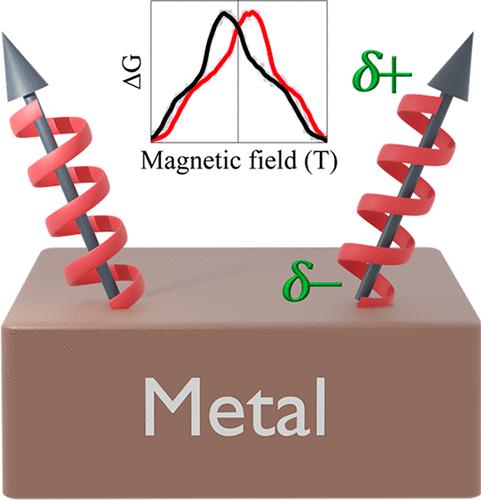当前位置:
X-MOL 学术
›
J. Phys. Chem. Lett.
›
论文详情
Our official English website, www.x-mol.net, welcomes your
feedback! (Note: you will need to create a separate account there.)
Modification of Weak Localization in Metallic Thin Films Due to the Adsorption of Chiral Molecules
The Journal of Physical Chemistry Letters ( IF 4.8 ) Pub Date : 2023-05-22 , DOI: 10.1021/acs.jpclett.3c00702 Meital Ozeri 1 , Jiahui Xu 2 , Gilad Bauer 3 , Linde A B Olde Olthof 2 , Graham Kimbell 2 , Angela Wittmann 4 , Shira Yochelis 3 , Jonas Fransson 5 , Jason W A Robinson 2 , Yossi Paltiel 3 , Oded Millo 1
The Journal of Physical Chemistry Letters ( IF 4.8 ) Pub Date : 2023-05-22 , DOI: 10.1021/acs.jpclett.3c00702 Meital Ozeri 1 , Jiahui Xu 2 , Gilad Bauer 3 , Linde A B Olde Olthof 2 , Graham Kimbell 2 , Angela Wittmann 4 , Shira Yochelis 3 , Jonas Fransson 5 , Jason W A Robinson 2 , Yossi Paltiel 3 , Oded Millo 1
Affiliation

|
We perform low-temperature magneto-conductance measurements on Cu and Au thin films with adsorbed chiral molecules and investigate their phase-coherent transport properties. Upon adsorption of chiral molecules, the spin–orbit coupling strength in Cu decreases and the Au films become ferromagnetic as evident from weak localization and antilocalization data. A theoretical model indicates that anisotropy in the molecular tilt angles, provided that the chiral molecules act as magnetic moments, induces a nonvanishing magnetic exchange interaction, causing changes in the spin–orbit coupling strength in Cu and Au. Our work adds a new viewpoint to the plethora of unique phenomena emerging from chiral molecule adsorption on materials.
中文翻译:

手性分子吸附对金属薄膜弱局域化的修饰
我们对吸附手性分子的 Cu 和 Au 薄膜进行低温磁导测量,并研究它们的相干传输特性。吸附手性分子后,Cu 中的自旋轨道耦合强度降低,Au 薄膜变成铁磁性,这从弱局域化和反局域化数据中可以明显看出。理论模型表明,如果手性分子充当磁矩,分子倾斜角的各向异性会引起非消失的磁交换相互作用,从而导致 Cu 和 Au 中自旋轨道耦合强度的变化。我们的工作为材料上手性分子吸附产生的大量独特现象增加了新的观点。
更新日期:2023-05-22
中文翻译:

手性分子吸附对金属薄膜弱局域化的修饰
我们对吸附手性分子的 Cu 和 Au 薄膜进行低温磁导测量,并研究它们的相干传输特性。吸附手性分子后,Cu 中的自旋轨道耦合强度降低,Au 薄膜变成铁磁性,这从弱局域化和反局域化数据中可以明显看出。理论模型表明,如果手性分子充当磁矩,分子倾斜角的各向异性会引起非消失的磁交换相互作用,从而导致 Cu 和 Au 中自旋轨道耦合强度的变化。我们的工作为材料上手性分子吸附产生的大量独特现象增加了新的观点。











































 京公网安备 11010802027423号
京公网安备 11010802027423号